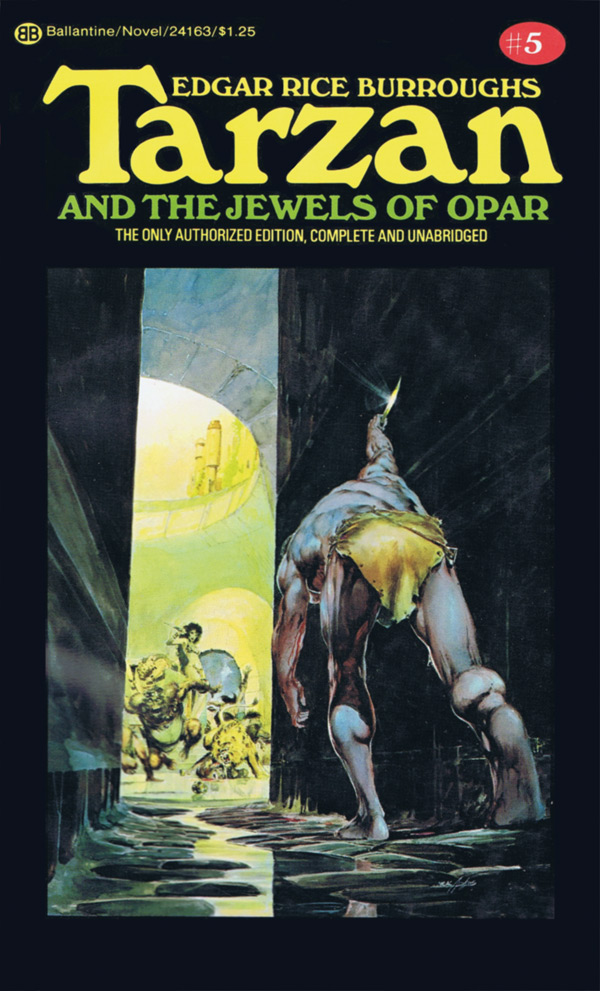Quite Quotable
 Sunday, June 8, 2014 at 08:47PM
Sunday, June 8, 2014 at 08:47PM The gods do not protect fools. Fools are protected by more capable fools.”
Larry Niven, Ringworld
 Larry Niven,
Larry Niven,  Ringworld,
Ringworld,  Science Fiction quotes in
Science Fiction quotes in  Quotes
Quotes  Sunday, June 8, 2014 at 08:47PM
Sunday, June 8, 2014 at 08:47PM The gods do not protect fools. Fools are protected by more capable fools.”
Larry Niven, Ringworld
 Larry Niven,
Larry Niven,  Ringworld,
Ringworld,  Science Fiction quotes in
Science Fiction quotes in  Quotes
Quotes  Sunday, June 1, 2014 at 11:01PM
Sunday, June 1, 2014 at 11:01PM Things are always going to be falling apart on Earth, you might as well get used to it.
Kim Stanley Robinson, Red Mars
 Thursday, May 29, 2014 at 02:44PM
Thursday, May 29, 2014 at 02:44PM  Burroughs’s fifth Tarzan novel, Tarzan of the Jewels of Opar, is the first, to me anyhow, that read like a stand-alone adventure. There were references to earlier volumes, we meet an old friend, the Waziri, and, of course, La and the lost city of Opar. Still, there is no narrative carry over the way there was with the Russian storyline. This would be a good place for the casual reader to jump in. There’s a sense of continuity but not a necessity to know it. For the dedicated reader, however, there’s little to be learned of the character or history of Tarzan.
Burroughs’s fifth Tarzan novel, Tarzan of the Jewels of Opar, is the first, to me anyhow, that read like a stand-alone adventure. There were references to earlier volumes, we meet an old friend, the Waziri, and, of course, La and the lost city of Opar. Still, there is no narrative carry over the way there was with the Russian storyline. This would be a good place for the casual reader to jump in. There’s a sense of continuity but not a necessity to know it. For the dedicated reader, however, there’s little to be learned of the character or history of Tarzan.
Be warned – spoilers ahead!
Tarzan has gone broke from some venture at the beginning of this tale. No big deal for him, since his fortune came from the lost colony of Atlantis, Opar. He simply has to go get more. Until, that is, he takes a blow to the head and awakens with amnesia. I don’t know how clichéd the plot device was during Burroughs’s time, but it just didn’t work for me. I could be biased; these types of stories tend to frustrate me. For one, I don’t like seeing the protagonist acting the opposite of the way he typically does. And for another, it just seems like a lazy, too simple way to make conflict. It happens, however, and bad stuff happens. Jane is kidnapped by a band of Arabs with plans for ransom. There’s the story of a Belgian who has murdered his officers and fled into the jungle and who gets wrapped up with the Arabs, and therefore Tarzan.
Yeah, my thoughts exactly – where’s Opar in all of this? I mean, he goes there, gets amnesia, and leaves. La does pursue him to win back a sacred knife and because she’s totally, madly in love with him, but that’s pretty much it. Everything, of course, works out in the end, but I was expecting a bit more from this one.
So, yes, I was disappointed. I rated it three on Goodreads, so I didn’t hate it. I didn’t not like it. I was just disappointed. Here’s my major complaints:
If I could point to one thing that saved the book from total disillusion, it was Mugambi and the Waziri. I was especially glad to see the return of Tarzan’s companion from Beasts, and his and the Waziri’s defense of Jane ranks as one of my favorite Edgar Rice Burroughs scenes. Probably in my top twenty of reading period. When the Arabs are attacking the Greystoke estate, the Warzir, lead by Mugambi, are gradually pushed into the house, then into the very room where Jane has sought refuge. They fight and die, not giving an inch freely. It was like a scene from Cy Endfield’s Zulu. When Mugambi fell, I was genuinely saddened. What a way to go though – very memorable. And then when Burroughs brought him back, I can honestly say I wasn’t totally surprised. I usually hate tricks like this one because they make the powerful death scene seem cheapened; it feels like a cheat. Not this time. I hope to see Mugambi later. (Of course, I wrote the same thing about Korak and Meriem last time, and look where that got me.)
The Jewels of Opar, by far, has been the biggest disappointment for me so far on this journey. I probably sound a bit more bitter than I actually am, but I was so looking forward to this one, more than many of the others just based on titles. Oh well, I’ve still got nineteen to go. I expect there will be lots of ups and downs along the way. Next on the list is The Jungle Tales of Tarzan. It’s a collection of short stories from Tarzan’s youth. If you’ve been thinking about joining the Adventure, here’s probably a very good chance to climb on board.
See you next time!
 Sunday, May 25, 2014 at 07:31PM
Sunday, May 25, 2014 at 07:31PM We are all slaves to our histories. If there is to be a .. bright future, we must learn to break those chains.
J. Michael Straczynski, GROPOS, Baybylon 5
 Sunday, May 18, 2014 at 04:26PM
Sunday, May 18, 2014 at 04:26PM It is shocking to find how many people do not believe they can learn, and how many more believe learning to be difficult.
Frank Herbert, Dune
 Dune,
Dune,  Frank Herbert,
Frank Herbert,  Science Fiction quotes in
Science Fiction quotes in  Quotes
Quotes